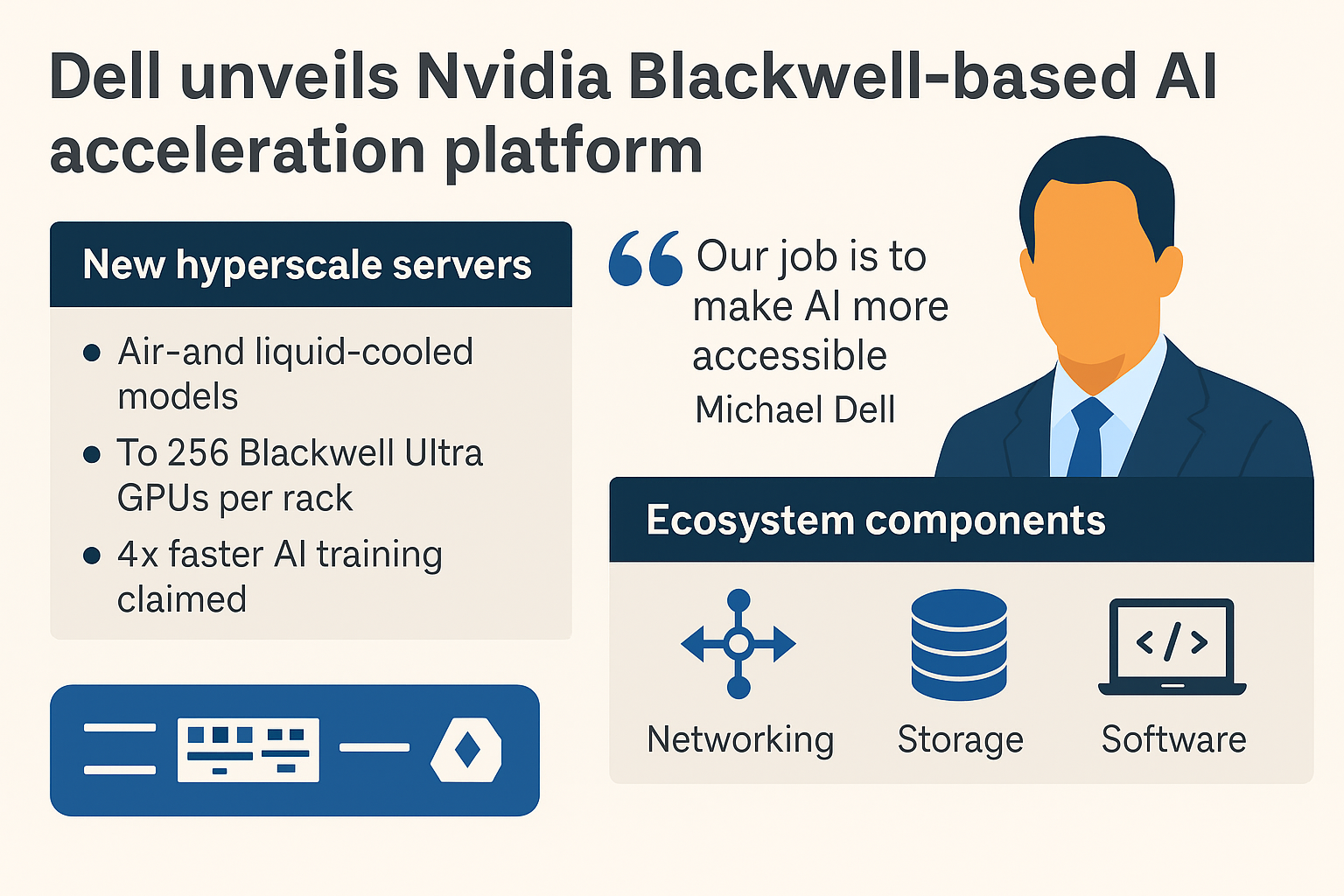Dell launches Nvidia Blackwell-based AI servers in 2025, aiming to simplify enterprise AI deployments with high-performance, liquid-cooled acceleration systems.
Published : 22 May 2025
Next-gen AI infrastructure promises faster training, smarter cooling, and full-lifecycle support for enterprise-scale deployment.
At Dell Technologies World 2025 in Las Vegas, Dell pulled the curtain back on its most advanced generation of AI acceleration servers, powered by Nvidia’s Blackwell Ultra GPUs. These new systems are engineered to meet the rising demands of enterprise AI, promising up to 4x faster model training compared to previous generations.
Michael Dell, Chairman and CEO, put it simply:
“We’re on a mission to bring AI to millions of customers around the world.”
What’s New in Dell’s AI Server Lineup?
Dell introduced a combination of air-cooled and liquid-cooled PowerEdge servers—the XE9780 and XE9785 for traditional data centers, and the XE9780L and XE9785L for high-efficiency, whole-rack liquid-cooled setups.
- Up to 192 Nvidia Blackwell Ultra GPUs per rack, scalable to 256 per Dell IR7000 rack
- Direct-to-chip liquid cooling for improved performance and reduced heat output
- Modular design to support evolving enterprise workloads
- Integration with Dell’s AI Factory platform for end-to-end lifecycle support
These updates aim to help companies transition from AI experimentation to production without compromise.
Real-World Impact: From R&D Labs to Full-Scale AI Factories
Dell’s upgraded infrastructure responds to a clear shift in the market—companies are no longer dabbling in AI; they’re scaling it. As AI workloads grow in complexity, organizations require faster computation, better cooling, and smarter integration across software and hardware layers.
Jensen Huang, CEO of Nvidia, emphasized the shift:
“AI factories are the infrastructure of modern industry.”
But What’s the Catch?
While the performance leap is significant, Dell has not yet disclosed pricing details, which will be critical for large-scale adoption. Additionally, liquid-cooled infrastructure may require costly data center upgrades, especially for enterprises not yet optimized for high-density deployments.
And while Dell remains a dominant force, competition is fierce. Rivals like Super Micro Computer are also pushing into the AI server space, though they face production cost challenges that could give Dell an edge—if it gets pricing right.
The Bigger Picture: Dell’s Full AI Acceleration Ecosystem
Dell isn’t just building servers—it’s constructing an entire AI infrastructure. Key components include:
- Networking: New PowerSwitch SN5600, SN2201, and Nvidia Quantum-X800 InfiniBand switches delivering up to 800 Gbps throughput
- Storage: ObjectScale platform upgraded with BlueField-3 DPU and Spectrum-4 integration for faster data management
- Software: Native support for Nvidia AI Enterprise, including NIM, NeMo, and Blueprints
- Managed Services: Dell is also offering monitoring, reporting, and lifecycle support, addressing the ongoing skills shortage in AI operations
Release Roadmap: Availability Timeline Through 2025
| Product | Availability |
|---|---|
| XE9780 & XE9785 (air-cooled) | Second Half of 2025 |
| XE9780L & XE9785L (liquid-cooled) | Later in 2025 |
| XE7745 (RTX Pro 6000) | July 2025 |
| XE9712 (GB300 NVL72) | H2 2025 |
Dell also confirmed long-term support for Nvidia’s Vera CPU and Vera Rubin platform, indicating a broader AI ecosystem play beyond just 2025.
Strategic Outlook: What’s Dell Really Aiming For?
This isn’t just a hardware launch—it’s a strategic repositioning. Dell wants to become a complete solution provider in the AI era, not just a server vendor.
That means:
- Managing end-to-end AI lifecycles
- Offering multi-layered infrastructure (compute, network, storage, software)
- Delivering operational ROI to justify capital investment
But success hinges on GPU availability—a critical factor as global demand for Blackwell accelerators surges. Dell’s partnership with Nvidia provides early access, but chip shortages remain a looming threat.
Final Thoughts
Dell’s 2025 Blackwell-powered AI platform is built for enterprises ready to take AI seriously—not just pilot it, but deploy it at scale. With support from Nvidia and a growing stack of services, Dell is clearly betting big on AI.
Yet, the race isn’t over. Market impact will depend on competitive pricing, infrastructure readiness, and—most importantly—business outcomes that justify the investment.
As we move into a new phase of industrial intelligence, Dell’s infrastructure could be the backbone for the next generation of AI-powered enterprises.


